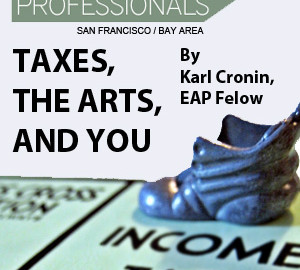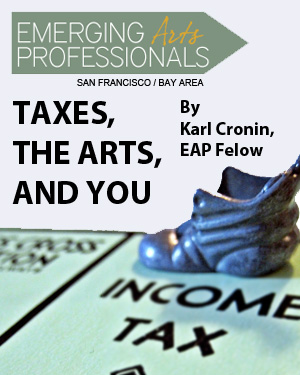Taxes, the Arts, and You
From a Sobering Affair … to Ecstasy?
On February 18, at 5:00 p.m., I left Fort Mason feeling oddly ecstatic. My pulse racing, I jumped on my bike and peddled feverishly. Blowing through stop signs. Dodging dog walkers. I simply couldn’t wait to get home and… start my 2011 tax return.
I should preface my story by saying that until California Lawyers for the Arts’ workshop Relax with Tax, I had been the kind of tax payer who puts off filing as long as possible. It’s depressing to look at meager performer stipends sitting in the files alongside travel receipts from festivals where I barely broke even. Filing taxes as an emerging artist is a sobering affair.
Relax with Tax focused primarily on the kinds deductions that sole proprietors should consider taking on their Schedule Cs. I have filed Schedule Cs since 2007 and, much to my surprise, I found I had indeed been taking all the appropriate deductions for my business. I always thought there was some magic deduction I’d been overlooking. Nope. Just the deductions you’d expect (home office, business travel, research expenses, etc.).
However, here are two takeaways I found useful.
It’s All One Business
Early in the workshop I asked if I should be filing two schedule Cs since I work in two distinct capacities: as an independent artist and as an independent arts consultant. The instructor, Tom Andres J.D, C.P.A., said, “No.” They are both arts-related and can go on the same Schedule C. For years I have leveraged my meager earnings as a freelance arts consultant to offset the losses from my emerging art practice. I have always felt it is one continuum of arts production, so it was a relief to find out that the federal government sees it the same way.
Hobby Loss Rule and Audits
We spent a lot of time in the workshop talking about the hobby loss rule, which basically discourages filers from claiming deductions for hobbies. The IRS wants you to make a profit. More specifically, they want to tax you on that profit. They want to make sure you are actually in it to win it. To make same cash. Otherwise, the deductions you’re taking for your “hobby” are just scamming the system.
As an independent artist, I have been afraid of an audit because I know that the IRS likes to see a profit after three years. While I’ve never reported a loss on my business, there have been years (particularly when I’ve been incubating new work) where my profits are awkwardly meager.
Yet my intent to be a gainfully-employed full-time artist are documented and clear. I create work. I send it out. I change tactics when things aren’t working. I join associations. I show up to meetings. I file my taxes. I’ve dedicated my life to making this a thriving business. I left the workshop feeling confident that were I to be audited, I could present my business with confidence. And you can too, by holding onto all those business cards, conference programs, notes from your research meetings, and your calendar.
This Arts Hustle
When I arrived home I dumped my receipts on the floor, and began sifting through the year. Relax with Tax confirmed that the piecemeal life I live — in which one day I’m writing a grant, another day producing a photo shoot, the next day coaching the ED of a nonprofit, or editing a promotional video — is indeed a business.
The nonprofit arts sector has some serious problems. We’ve all been to the conference break-out sessions: “Where are the patrons?” “Concert dance in the age of new media.” “Music licensing in the age of Youtube.” Yet, step by step, year by year, we are each building sustainable arts practices against the odds. If we each can become crystal clear about our income, expenses, ROIs, margins, and tax deductions, perhaps we can participate more fully in the collective building of a new arts economy.
Are you working on your taxes now? Let us know in the comments what challenges you’ve faced and what advice you’ve found helpful.
Image: Images of Money






Fees for performing, lectures or talks, revenue from sale of art are not consistent, unless we are on staff at a set salary. Keeping records of income and expenses on going really helps. Don't forget expenses used to promote- from mileage to-and-from, and office supplies.An individual can work off social security number, or establish a second i.d. number. The system is not 'unfriendly'.
After I open up your Feed it seems to be a lot of nonsense, is the problem on my side?
Can you explain a bit more what you mean by our feed? Are you subscribing via RSS? Please feel free to send a screenshot to michael.m.delong@gmail.com. ~Michael, managing editor